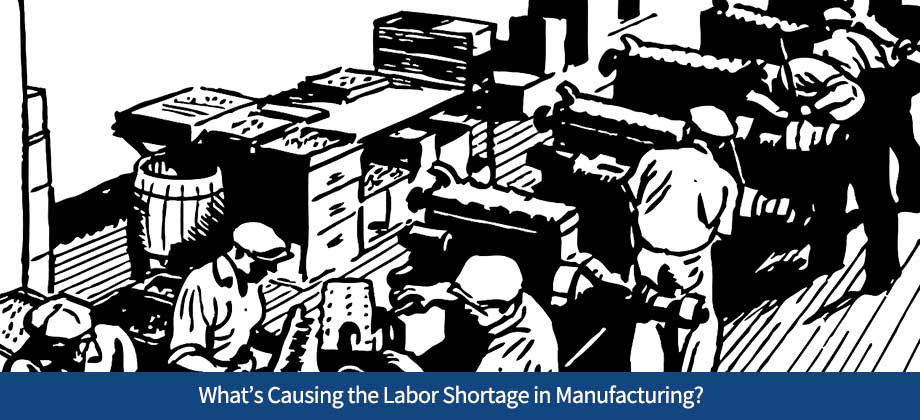What’s Causing the Labor Shortage in Manufacturing?

With over 16 million employees in the United States manufacturing industry as of 2022, it might be difficult to fathom there’s actually a labor shortage. During the pandemic, 1.4 million manufacturing jobs were lost–which effectively erased nearly a decade of gains made in manufacturing employment. Many of those jobs were able to be recovered, however there is still a deficit of 500,000 open positions that stubbornly remain unfilled. What is the root cause of this labor shortage? That’s what we’re here to shed some light on.
Getting Entry-Level Talent Through the Door
Entry-level jobs in the manufacturing industry are inclusive of production associate positions that don’t necessarily require any type of industry knowledge or advanced training. Think of assembly line workers or hand-held tool cutters. The folks best suited for these roles are great at the basics of human strengths: following directions, being eager to learn, and asking questions. Since the pandemic, a lot of these entry-level roles have been filled by folks who used to work in industries significantly impacted by COVID-19, such as retail and restaurant services. The starting pay is nearly twice as high as the federal minimum wage, and with no experience required outside of a high school diploma, it would seem filling these roles would be a cake walk–but that’s not the case. Some predictions are that younger workers are being lured into other lucrative industries such as the technology and healthcare sectors. And the Baby Boomer generation, once a stronghold in the manufacturing industry, is ready to retire; there is reason to suggest that 22 percent of the qualified manufacturing workforce will be retired by the year 2025. There just don’t seem to be enough willing job seekers out there to mitigate the mass exodus of those retirees.
Getting Mid-Level Talent Through the Door
Middle-skill workers in the manufacturing industry are another elusive group hindering the ability to fill empty positions. Jobs such as welders, maintenance techs, and computer numerical control (CNC) machinists require some type of technical training or skillset that can’t be accommodated by someone fresh out of high school. It can take months to years in a hands-on training program to become certified in these spaces. To fill these critical roles, companies will also need to uncover new ways to train tomorrow’s workers.
Staying On-Par with Technology
We’ve all heard the phrase that robots are going to take all of our jobs. Sure, robots can lift and pack boxes, but they can never replace the decision making and critical thinking skills that humans possess. Even still, there is a technology transformation happening in the manufacturing space that we need to focus our efforts on getting ahead of. As we progress technologically, the skills needed to complete manufacturing tasks will also have to keep up. According to Deloitte, “without making changes to the skills composition of the workforce, manufacturers could leave up to 2.1 million jobs unfilled between 2020 and 2030, impacting everything from productivity to innovation and competitiveness to GDP.”
A Shaky Reputation
Another one of the issues affecting the manufacturing sector seems to be negative PR. Younger generations tend to view manufacturing jobs as dangerous, hot, labor-intensive, and low-paying. In short, they have a terrible reputation. Companies need to do better at communicating the benefits of working in the manufacturing industry, highlighting what sets them apart from the overall negative perception so many younger folks have. Many companies today have a robust diversity, equity, and inclusion strategy; boast competitive pay and benefits; and offer countless training opportunities to advance a workers’ skillset without additional schooling. Career growth is something else a lot of new job hunters are desperately seeking–which isn’t necessarily something an entry-level candidate will be offered in other industries outside the manufacturing sector. To fill these open roles, it’s critical that manufacturing industry leaders highlight what the people really need, and how their company fills that need.
What Can Business Owners Do to Improve the Situation?
We’ve touched on the top reasons why there is a labor shortage in manufacturing, but what are some solutions that business owners can adopt to improve the situation? First off, shift your marketing and recruiting strategies to focus on how manufacturing is a great career choice for younger generations. Research what the current perception of the industry is and how your business can position it differently. You can also partner with your local community colleges, technical high schools, and vocational programs to learn about their curricula, and make sure they’re aware of the top skills you’re looking for in candidates. And consider taking it a step further by sponsoring scholarships or grants to these programs.
Investing in your employees is a strategy every business owner should be hyper-focused on. It’s cheaper to grow your existing staff than it is to continually hire/lay off employees. That being said, small investments in career development can have a big-time payoff. An interest-only revolving line of credit from ARF Financial presents business owners with the flexibility to access capital while keeping their cash flow stable. It’s a unique product that puts you in complete control: You get to decide when to borrow, how much to borrow, what size your payments should be, and how long you want to keep the loan. Use the funds to provide employees with advanced training opportunities, workshops, and certifications.
Industries across the board have faced and overcome challenges no one saw coming pre-pandemic. If we can identify the issues within the manufacturing sector and focus our efforts on reshaping the industry, we’ll eventually end up with a robust workforce. Progress takes time–and right now, it’s all hands on deck.
Your privacy is important to us. ARF Financial will never sell or rent your information to any third party. Click here for more information about our privacy policy.

